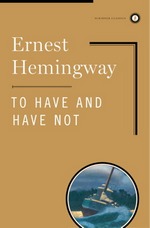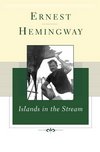 To Have and Have Not by Ernest Hemingway
To Have and Have Not by Ernest Hemingway
What a miserable book! Harry Morgan is an almost thoroughly despicable character in a pointless book full of sad, pathetic and incomplete plots. I think I can see where Hemingway was trying to stretch as an author, the multiple perspectives he writes from here is a different approach for him (one that doesn’t succeed too well), for example. But I thought this failed utterly.
Towards the end of the book, there’s a few pages where Hemingway gives us snapshots of various characters aboard different boats in the marina — all of whom we only see here in a few paragraphs — I thought this was effective, light years beyond the rest of the novel. It felt quite out of place, a diamond in the rough. (which may suggest it wasn’t as good as I thought, it just seemed so much better — I don’t think that’s the case, but it’s possible)
Oh, this also featured possibly the least erotic sex scene I’ve read this side of Tom Wolfe (actually, may be worse than Wolfe). Nothing to make hay about there, just thought I’d note it as it really bugged me.
—–






